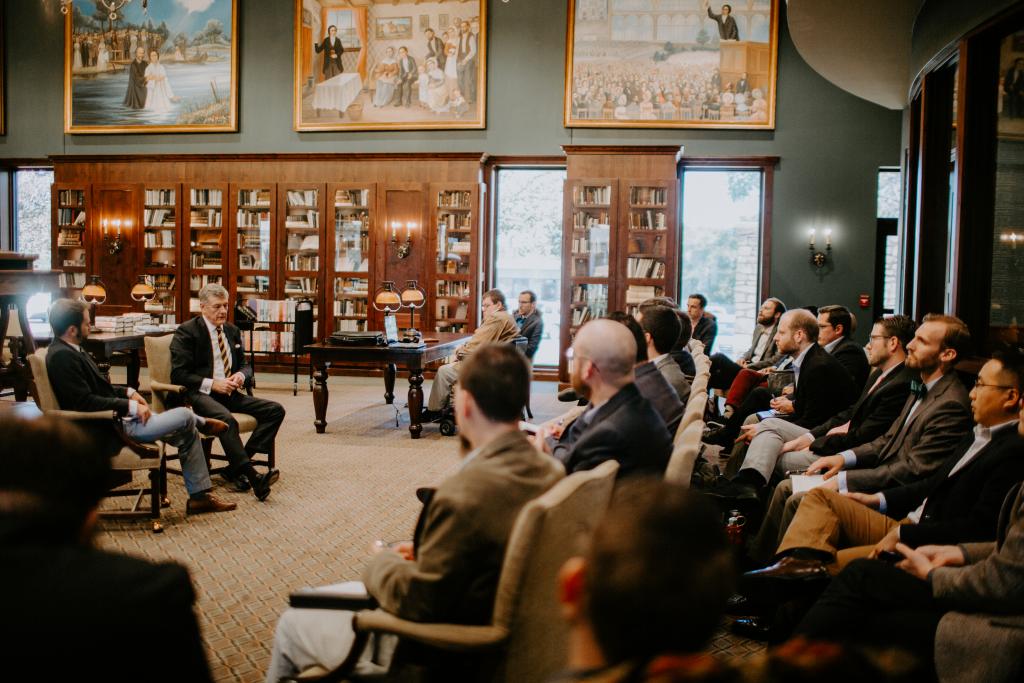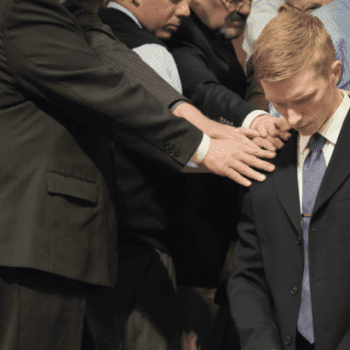 The pastor-theologian is a subject of great interest to me, as my introduction to the book The Pastor as Scholar, the Scholar as Pastor: Reflections on Life and Ministry (Crossway, 2011) by John Piper and D. A. Carson shows. Because of this, my ears perked when, in the recent debate over the mission of the church, missiologist Ed Stetzer suggested that pastors Kevin DeYoung and Greg Gilbert were not adequately prepared to do “careful theological thinking” on the topic du jour.
The pastor-theologian is a subject of great interest to me, as my introduction to the book The Pastor as Scholar, the Scholar as Pastor: Reflections on Life and Ministry (Crossway, 2011) by John Piper and D. A. Carson shows. Because of this, my ears perked when, in the recent debate over the mission of the church, missiologist Ed Stetzer suggested that pastors Kevin DeYoung and Greg Gilbert were not adequately prepared to do “careful theological thinking” on the topic du jour.
Here’s what Stetzer in the middle of his lengthy and stimulating Themelios review of What Is the Mission of the Church? (Crossway, 2011) by DeYoung and Gilbert (HT: JT):
Herein may be the book’s greatest challenge. The authors list the books they read to prepare for this response to the widening of the mission. Yet reading a couple dozen books is simply not adequate (or appropriate) to prepare themselves to stand against the careful theological thinking that has contributed to the widening of our understanding of mission and the prevailing view of evangelicals (if Lausanne’s Cape Town statement is a gauge).
At the conclusion, he had this to say in reference to the lack of “background and engagement” on the part of DeYoung and Gilbert:
However, I think it ultimately will not succeed at its task. Instead, it will have some people needlessly looking to parse terms when the mission instead is more about faithfulness. Those who read and share the book may very well be those who most need a stronger missional focus—the theologically minded who think deeply but engage weakly. Yet those who could benefit from the book will not read it because the authors lack the background and engagement to make the case to the missional and missiological community.
This review will not attempt to answer the question front and center in this debate; I have not finished the text by DeYoung and Gilbert, but am resonating deeply with it. My review of Gabe Lyons’s Next Christians finds much sympathy with What Is the Mission of the Church?. Nor am I taking on Ed Stetzer in this little blog post. He’s a gifted thinker and leader, and I appreciate much of his scholarly and churchly program. He is the go-to evangelical theologian on “missional” ministry, a churchman, and a Southern Baptist leader.
I would say, though, that Stetzer’s comments on the inadequate preparation of Kevin and Greg took me aback. Merely reading books does not make someone an expert, it is true. But that’s hardly all that these two young pastors–friends of mine–have done. Kevin has an MDiv from Gordon-Conwell Theological Seminary. Greg has an MDiv from The Southern Baptist Theological Seminary and did PhD work at SBTS before taking up pastoral work. If an MDiv is not adequate preparation for high-level theological thinking, many of us have wasted our money and hard-earned effort. Both of these men have proven themselves, furthermore, to be gifted thinkers (In fact, I think both of them won “top graduate” awards or some such thing at their respective seminaries).
If only doctors in missiology can participate in missiological conversations, then we’re in trouble, because the group will be very small indeed. Kevin and Greg have read widely to prepare themselves for the task before them in their missiology text, and they are most definitely up to said task. Their extensive reading on the subject, coupled with their own preparation, fits them very well to speak into the subject. Who is not a practitioner of “mission,” after all, if pastors are not? Surely missionaries lead the front-lines challenge, but hasn’t the whole discussion on “missions” broadened in the last decade or two to include a wider scope of activity? Isn’t a crucial part of the “missional” conversation that pastors are at the forefront of “missional” ministry? Are not pastors like Mark Driscoll, Jeff Vandersteldt, and Tim Chester leading the way in “missional” strategy, whether through books, speaking, or practice? Or am I missing something?
Pastors who lead their church members to support missions, pray for missions, go on missions trips, give their very lives to the missions cause, live evangelistically, reach out to the local community in myriad ways, and generally “be on mission” everyday seem to eminently possess the “background and engagement” necessary to comment on missions, particularly if these pastors have strong theological and biblical preparation and have acquitted themselves well in the evangelical public square. Other than a missiologist or missionary, who is more prepared than a local church pastor to speak about the mission of the local church? I’m baffled as to whom else we might call upon.
Let me push this a little further. Mark Dever’s endorsement of the book references Kevin and Greg as “pastor-theologians.” I think that’s exactly right. I fear that at least part of Stetzer’s critique of the credentials of these men owes to an unhelpful divide between church and academy that has exploded the traditional model of the pastorate. Pastors, goes the line, do ministry; academics, goes the line, think and write. Sure, maybe pastors write books on practical spirituality or tithing or overcoming temptation. But they can’t really step up to the plate and actually do theology.
Nothing could be further from the truth. The historic Reformed model of the pastorate is that of the pastor-theologian. Luther, Calvin, the Puritans, Edwards, Spurgeon, Lloyd-Jones–these were pastors who wrote theology. They knew no unhelpful divide between church and academy. Neither do Kevin and Greg. Their text is not published by Brill or T&T Clark, of course–it is aimed at pastors and thinkers. But it is undoubtedly a work of theology. The authors are undoubtedly pastor-theologians, agree with them or not.
We are in trouble if we assume that pastors–especially well-trained and widely published pastors–are not qualified to participate in theological conversation. In all of this, by the way, I should not be read as critical of “missional” thinking. I try to practice a form of it and appreciate it and have many friends and colleagues who feel the same way.
Now, Stetzer has qualified his position in a later post. He’s backed off the remarks I quoted above and suggested that “an academic book review would be incomplete without asking if the authors were adequately prepared to make their case.” I’m not sure that’s exactly what Ed was getting at; I think he actually seemed to be saying, pretty clearly, that Kevin and Greg frankly aren’t prepared for this conversation. He went on to say in his response that “I think more preparation, experience, and conversations would have served them well.” From my read of the Deyoung and Gilbert book, there’s a great deal of interaction with “missional” thinkers and writers. The issue here is not really preparation or interaction, as I am able to piece things together, but agreement. Kevin and Greg have plenty of preparation and outdid themselves in terms of interaction. They just parse things a bit differently than Stetzer and some self-professed “missional” folks.
By the way, Stetzer references the “Cape Town Statement” of Lausanne 2010 as–unlike What Is the Mission of the Church?— a piece of careful theological thinking. But if one thinks about the earlier Cape Town Statement of 1974, the foundational theological document of the Lausanne movement, was it not John Stott who essentially drafted it in 1974? It seems it was. What was Stott for much of his life? A pastor. And what was Stott when he drafted the Statement? A pastor.
There is some irony, then, in Stetzer’s critique, which otherwise offers much food for thought.











